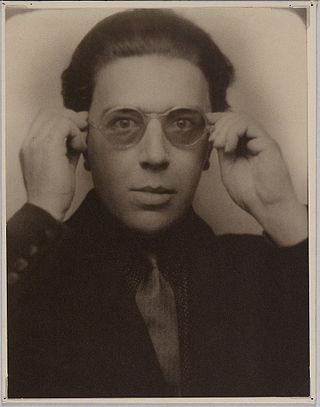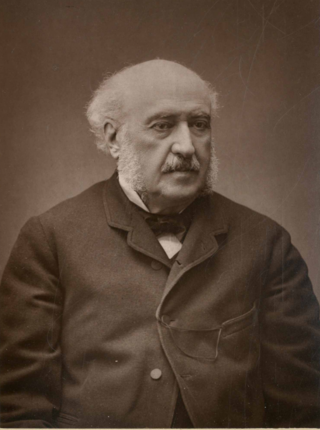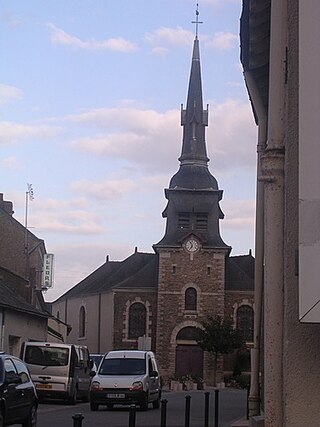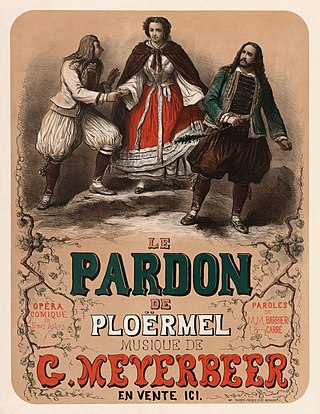
Breton is a Southwestern Brittonic language of the Celtic language group spoken in Brittany, part of modern-day France. It is the only Celtic language still widely in use on the European mainland, albeit as a member of the insular branch instead of the continental grouping.

Brittany is a peninsula, historical country and cultural area in the north-west of modern France, covering the western part of what was known as Armorica during the period of Roman occupation. It became an independent kingdom and then a duchy before being united with the Kingdom of France in 1532 as a province governed as a separate nation under the crown.

André Robert Breton was a French writer and poet, the co-founder, leader, and principal theorist of surrealism. His writings include the first Surrealist Manifesto of 1924, in which he defined surrealism as "pure psychic automatism".

Nantes is a city in the Loire-Atlantique department of France on the Loire, 50 km (31 mi) from the Atlantic coast. The city is the sixth largest in France, with a population of 320,732 in Nantes proper and a metropolitan area of nearly 1 million inhabitants (2020). With Saint-Nazaire, a seaport on the Loire estuary, Nantes forms one of the main north-western French metropolitan agglomerations.

Jules François Simon was a French statesman and philosopher, and one of the leaders of the Moderate Republicans in the Third French Republic.

Joyce Mansour nee Joyce Patricia Adès,, was an Egyptian-French author, notable as a surrealist poet. She became the best known surrealist female poet, author of 16 books of poetry, as well as a number of important prose and theatre pieces.
The surname Gros may have several origins. In French, it is a nickname for a big, fat person. Likewise, in Romanian, Groș is a word for "large". In several languages, it is a spelling variant of the German surname Gross. See also Legros.

France has one official language, the French language. The French government does not regulate the choice of language in publications by individuals, but the use of French is required by law in commercial and workplace communications. In addition to mandating the use of French in the territory of the Republic, the French government tries to promote French in the European Union and globally through institutions such as La Francophonie. The perceived threat from Anglicisation has prompted efforts to safeguard the position of the French language in France.

The Bretons are an ethnic group native to Brittany, north-western France. They trace their heritage to groups of Brittonic speakers who emigrated from southwestern Great Britain, particularly Cornwall and Devon, mostly during the Anglo-Saxon settlement of Britain. They migrated in waves from the 3rd to 9th century into Armorica, which was subsequently named Brittany after them.
In Occitan, vergonha refers to the effects of various language discriminatory policies of the government of France on its minorities whose native language was deemed a patois, where a Romance language spoken in the country other than Standard French, such as Occitan or the langues d'oïl, as well as other non-Romance languages such as Alsatian and Basque, were suppressed. Vergonha is imagined as a process of "being made to reject and feel ashamed of one's mother tongue through official exclusion, humiliation at school and rejection from the media", as organized and sanctioned by French political leaders from Henri Grégoire onward.

The symbole, also called ar vuoc'h, was an object used by Francophone headmasters in public and private schools in Brittany, French Flanders, Occitania, Basque Country and North Catalonia as a means of punishment for students caught speaking Breton, Flemish, Occitan, Basque, or Catalan during the 19th and 20th centuries.

Ligné is a commune in the Loire-Atlantique department in western France.
Events from the year 1992 in France.

Dinorah, originally Le pardon de Ploërmel, is an 1859 French opéra comique in three acts with music by Giacomo Meyerbeer and a libretto by Jules Barbier and Michel Carré. The story takes place near the rural town of Ploërmel and is based on two Breton tales by Émile Souvestre, "La Chasse aux trésors" and "Le Kacouss de l'Armor", both published separately in 1850 in the Revue des deux mondes.
Events from the year 1890 in France.

The Musée des Beaux-Arts d'Arras is located in the old Abbey of St. Vaast in Arras, in the Nord-Pas-de-Calais, France.
Auguste Le Breton was a French novelist who wrote primarily about the criminal underworld. His novels were adapted into several notable films of the 1950s, such as Rififi, Razzia sur la chnouf, Le rouge est mis and Le clan des siciliens. He wrote the dialogue for the noir film Bob le flambeur.

Alfred Guillou was a French painter of Breton heritage.

Renan Larue is a French writer, literary scholar and historian of vegetarianism. He is the author of several books on vegetarianism or veganism, including Le végétarisme et ses ennemis (2015), a history of vegetarianism from Pythagoras until the modern day, and La pensée végane: 50 regards sur la condition animale (2020). In 2016 he offered the first course in vegan studies in the United States at the University of California, Santa Barbara.














